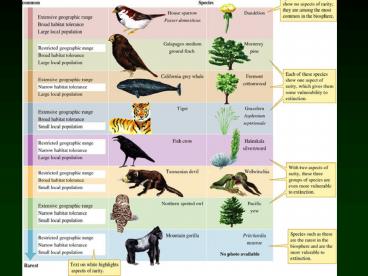How to estimate population size N - PowerPoint PPT Presentation
1 / 21
Title:
How to estimate population size N
Description:
How to estimate population size (N) Mark a subset of individuals (M) ... gecko. Population dynamics. and dispersal. R0 = Net reproductive rate ... – PowerPoint PPT presentation
Number of Views:37
Avg rating:3.0/5.0
Title: How to estimate population size N
1
(No Transcript)
2
How to estimate population size (N)
- Mark a subset of individuals (M)
- Release M back into initial area
- Recapture another subset after a delay (n)
- Count marked individuals (m) in subset n
- Compare ratios m/n M/N
- N M(n/m)
- Problems with this method?
3
How do you mark a tree frog?
4
Australian gecko
Nice amphibian toes . . .
5
Population dynamics
and dispersal
6
R0 Net reproductive rate the average number
of offspring produced by an individual in a
population during its lifetime or per
generation
7
Per capita rate of increase r
- r birth rate minus death rate
- r (ln R0)/T
- R0 net reproductive rate
- T average generation time
Use for overlapping generations (continuous
breeders e.g., humans, bacteria)
8
- ? Geometric rate of increase
- Nt1/Nt
- Nt initial population
- Nt1 pop. one round later
Use for populations with non-overlapping
generations (e.g., annual plants, yearly breeders
like deer, loons)
9
Population increase for phlox, an annual plant
- Non-overlapping generations, so R0 equals Nt1/Nt
- Nt1 2408
- Nt 996
- 2408/996 2.418
- r (per capita rate of increase) lnR0/T
- r 0.88
10
Size of organism versus generation time
11
Survivorship Curves
12
Dall Sheep Type I survivorship
13
American robin (Turdus migratorius) Type II
survivorship
14
Maple trees Type III survivorship
15
Population age structure
Rio Grande Cottonwoods
White oaks
16
Large cactus finches (Galapagos islands)
Age distribution
17
Age structure human populations
18
(No Transcript)
19
Range expansion March of the Killer Bees
20
Range expansion of collared doves
21
Rates of range expansion































